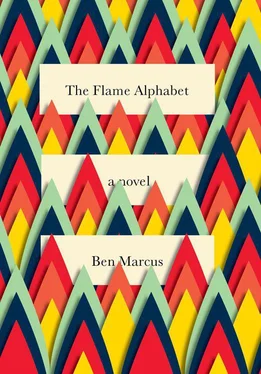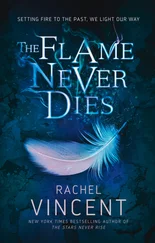I never went to the hut at night. But tonight would seem to be an exception to the rule. These last months were an exception, if one wanted to be strict about it. It was hard not to feel that the codes of access at our hut were written for unexceptional times. All the guidance I knew was written for unexceptional times.
I climbed the last of the riverbank and bushwhacked through low, dry branches until finally I reached the little footpath that would lead me along the southern approach to the hut.
Before I even arrived I saw the wild glare of a flashlight. An oily glow zoomed through the woods and I ducked down to watch. The hut had no window, just a framed hole long relieved of its glass.
On warm days Claire sometimes sat in the empty window frame while I readied the transmission.
Now inside our hut a man crouched and shook, peered out at the forest. Parts of him were all I could see. I stayed hidden in the trees, watching that smooth, preserved face, the orange hair boiling on the head.
LeBov was alive and he was Murphy.
He looked from the window hole with the light under his face, showing himself to the dark woods.
I circled quietly, keeping my distance. From behind a tree I watched as he went in and out of the hut, sweeping his flashlight in small arcs of discovery.
Occasionally the flashlight settled on something and he dilated the lens. He’d stoop over, pick something up, examine it in the light, then, invariably, he’d toss it to the ground and resume his search.
LeBov circled behind the hut, dragged over a crate, and climbed up on the roof. From there he crouched, seemed to pick at the shingles, and then slid down and disappeared, the glare from his flashlight strobing in the high branches.
I dug in against the embankment. LeBov’s flashlight retreated into the far woods behind the hut, and then I heard nothing, saw no more light.
I sat back to rest. I’d give it a little bit more time.
I should have gone home. At home there was still so much to do. We had to pack, ready the house. Claire would need help. Perhaps I could lift her into the bath, let her soak. More than that, she might need persuading. I had to think about how I would explain our next move, how to remove all choice from my presentation.
She’d want to stay. Beg to stay. But I couldn’t let her.
Staying wasn’t staying. They’d find you and wouldn’t have stayed at all.
Beyond that were my medical supplies, just a bare minimum, and where to put them. The key gear, and then at least a suitcase’s worth of medicine. I’d want to resume my work as soon as we relocated. To lose momentum now would be a mistake.
But I didn’t go home. The woods were fully quiet now, the light was gone. LeBov had no doubt finished with his defilement and moved on to other fine projects. I’d missed my chance to confront him and I will admit that I was relieved.
I groped into the darkness toward the hut. In front of me I could not even see my hand. With each step I braced myself for a collision, something sharp to strike my face.
I’d spent so many days here, thoroughly explored the grounds, dug shallow holes each time I buried the listener. Claire and I had walked home thoughtlessly, paying no attention to our surroundings, and we’d never been lost, never felt scared by unexplained sounds in the woods.
Now in the darkness, hours before we would leave town for good, I was completely helpless just steps from the hut. I wish to remark on the darkness of this place without resorting to hyperbole, but I do not think that is possible.
I reached out my arms, leaned, then fell into the dirt.
It was easier from there to move on hands and knees, but I needed to keep one arm up to guard my head. I crawled through frozen mud, butted into a tree stump, then corrected my attack and crept forward. Finally I struck the wall of the hut, and from there I guided myself until I collided with the staircase.
When I opened the door, a flashlight switched on. LeBov had wedged himself into the floor, his legs dangling down the hole.
“There you are,” he said.
Across the hut floor he slid the grease tin, and I scooped some of it into my mouth.
He gestured to his neck, so I spread some there as well, pasting the white collar tighter on my skin.
It took hold in my face, softening my mouth, and my vision sharpened. When the tightness in my throat released, I found I could speak more easily, even if the ability brought nausea along with it.
“This is private property,” I said quietly.
“Oh? I’d love to see your deed.”
I stepped inside, leaned against the doorway.
“Maybe first you could let me know to whom I am speaking,” I said.
“You’re not the only one who can use a fake name.”
“Apparently not.”
His legs seemed trapped in the hole.
“Can I help you?” I asked.
I wanted him to be aware that I could take two steps up to him and deliver a sweet kick to his face. He would not be able to get away from me in time.
“No, thanks,” he said, oblivious that I was sparing him. “I have everything I need.”
He reached across the floor and grabbed a duffel bag, which clanged as he dragged it.
“I was saddened to hear of your death,” I said. “It’s a great loss. For all of us.”
“Thank you. You sound sad.”
“Yes, actually. I am sad. I’m sad that you’re here where you do not belong. It’s private, and there’s nothing here for you.”
“Nothing,” he said. “I wouldn’t call this nothing.”
He held up my listener. It was ripped down the middle, coated on its underside with something shiny. The bottom pouch was leaking and the gel had spread over LeBov’s hands.
“Okay, good for you. You must be so pleased.”
“I am fairly pleased,” he said. “I thought that I might need your help, but I don’t. Now I need to get myself down this hole.”
He screwed himself farther in, squeezing his hips past the floorboards.
I’d never gotten in that far, but I’d never had to.
“That’s not how it works,” I said. “There’s nothing down there. You’re missing the point.”
LeBov was submerged to the shoulders now, holding his bag above his head as if he were about to wade across a stream. He was trying to vanish down the little hole in the floor that normally housed our transmission cables.
“Believe me,” he said. “I am not missing the point. I think that you’re the one who has missed the point.”
Something was wrong. LeBov was straining, turning red. He couldn’t force himself through, so he squirmed out of the hole and retrieved a saw from his bag. From a position on his stomach he reached into the hole and started sawing, stopping to examine his work with the flashlight. When he finished sawing, he sat up and raised a finger as if we were meant to listen for something.
We heard the clatter of wood falling away from us, but we did not hear it land.
Probably the rubber balls at the bottom of the hole absorbed the impact.
“Maybe now,” he said.
I told LeBov that I felt obliged to ask him some questions.
“That sounds like a burden. Unburden yourself. By all means. You have about forty-five seconds. If that’s how you’d like to use your remaining time, feel free.”
“Okay. Why did you do it?”
LeBov didn’t even take a minute to think. It was as though I’d asked him a question he’d rehearsed all his life. From LeBov I merited the canned response, deflection delivered with a hint of superiority. I hated people who could answer questions like these. Any kind of questions, maybe.
“There are certain boundaries that I’d prefer not to observe when it comes to my own identity,” LeBov said. “There’s a lot of behavior that I want to accomplish, but I don’t need all of it, or really any of it, attributed to me. Attribution is a burden. In that sense I’m less like a person, a person as you might think of one, and more like an organization. There’s also behavior that I need to undo, to take away, and this is often best accomplished by others, people who can erase action, alter ideas. I have a staff who work for me, of course. It’s always startled me that people are so cautious when it comes to who exactly they are. It’s almost the only thing we actually get to control. What a missed opportunity, really. For instance, you don’t even know that I’m the real LeBov. But it’s hard to grieve the choices made, or not made, by uninspired people. The sympathy allotment doesn’t extend that far.”
Читать дальше











